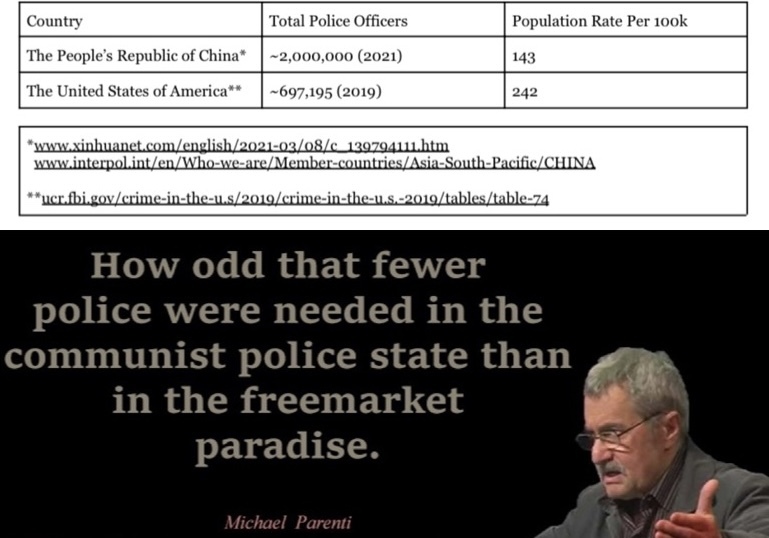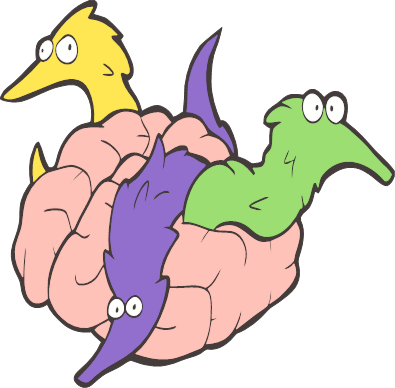In Xi’s case laws needed to be changed to give him the ability to run a third time. IMO moving towards a more authoritarian state is never going to result in a move towards socialism as it further entrenches power in an elite.
- Authoritarianism (rule by authority) isn’t a valid concept (by which manner of authority? the authority of which class?). All societies are ruled by blind authority, but the status quo asserts itself as natural and everything against it becomes “authoritarian.” The immediate aim of the liquidation of the national bourgeoisie’s political power taken up by the dictatorship of the proletariat is not in any sense removed from bourgeois power elsewhere. This point manifests itself in the consideration of the state of the press, which has more and more become a close link between the capitalist class at large, a class that retains a political dictatorship over the majority of developed nations and several national dictatorships over their respective colonial shares of maldeveloped nations. Owing to the supreme authority of the world bourgeoisie, the proletarian masses who have consolidated political power domestically must suppress the siege on their delicate rule internationally. There are more prisoners per-capita and in total in the U.S. than in China, not to mention the clear difference in ownership of the factors of production, and yet this “authoritarianism” comes up again and again in rhetoric

-
I explained the term limit change in my other reply to you [link]. There is no possible way to categorize this as “authoritarian” or “entrenching power in the elite.”
-
This is an extreme non-reply. Leadership in the DPRK is diffused (explanation below). You never explain how “the state seems to work to perpetuate [hereditary succession, although succession is complex, as I already mentioned with the diffusion of power from Kim Il Sung].”
The fact that there were historical justifications made for Kim Il Sung to pass it to his son is meaningless.
Actually it explains the reason why voters might follow this pattern, and of course nothing in the article I wrote was addressed. As for “hereditary monarchy claims”, Kim Jong Un is General Secretary of the Workers Party of Korea, and Chairman of the State Affairs Commission. These positions are elected by the WPK Party Congress and by the Supreme People’s Assembly respectively.
- Sidenote: parties are elected by the people every five years (under the DFRF), the WPK isn’t permanently leading [other parties include the KSDP and the CCP]
If Kim Jong Un didn’t wish to continue to hold his positions, one of the Vice-Chairpersons would take his place temporarily, and a successor would be discussed and elected at the next party conference, also likely a Vice-Chairperson. For example, Kim Jong Il was elected into the Party Central Committee in the 70’s, and in 1974 was elected as the successor to Kim Il Sung. Jang Song-Thaek was elected to succeed Kim Jong Il, however, he wanted to reform certain areas, thus debate regarding his intentions and whether he was a revisionist or not ensued; the party then switched and had Kim Jong Un succeed Kim Jong Il. Jang Song-Thaek then staged a coup in an attempt to consolidate power by force (confirming his intentions were not pure and that he was likely a revisionist in the intent of his “reform”). He was executed thereafter. It’s important to mention Jang Song-Thaek to show that a successor to Chairman of the SAC doesn’t have to be a direct child of the former. So, if Kim Jong Un were to retire, or wish to discontinue his positions, it would be somebody in the Politburo, or a Vice-Chairperson of the State Affairs Commission, to succeed him. However, there currently isn’t an elected successor appointed, because likely odds are that he isn’t retiring or dying in the near future. Kim Jong Un is not actually in total control of the DPRK; the Supreme People’s Assembly has, by far, the extreme majority of control over the latter. Kim Jong Un has never been in either the Supreme People’s Assembly or its respective Standing Committee. Premier is the second top rank within the SPA, currently held by Kim Jae Ryong [not related]. President of the Standing Committee (Presidium) is the top position within the SPA, a position held by Kim Yong-Nam [not related] until April 2019, where Choe Ryong-Hae thereafter was elected. That isn’t to say that Kim Jong Un holds no power within the DPRK, but anyone within the SPA certainly has more legislative authority. Each person within the SPA, including Premier and Head of the Presidium, is elected (and thus their power is temporary and can be removed at any time). The closest thing to a dictatorship (so to speak) in the DPRK is the Dictatorship of the Proletariat, a determining class dictatorship of the majority which governs the state. The only of the Kim family members (remember this is a common Korean surname, I am referring to the lineage of Kim Il Sung) to have an SPA position was Kim Il Sung, and he abolished his position. The “next in line” leader in the WPK is likely not to be a descendant of Kim Il Sung either.




deleted by creator